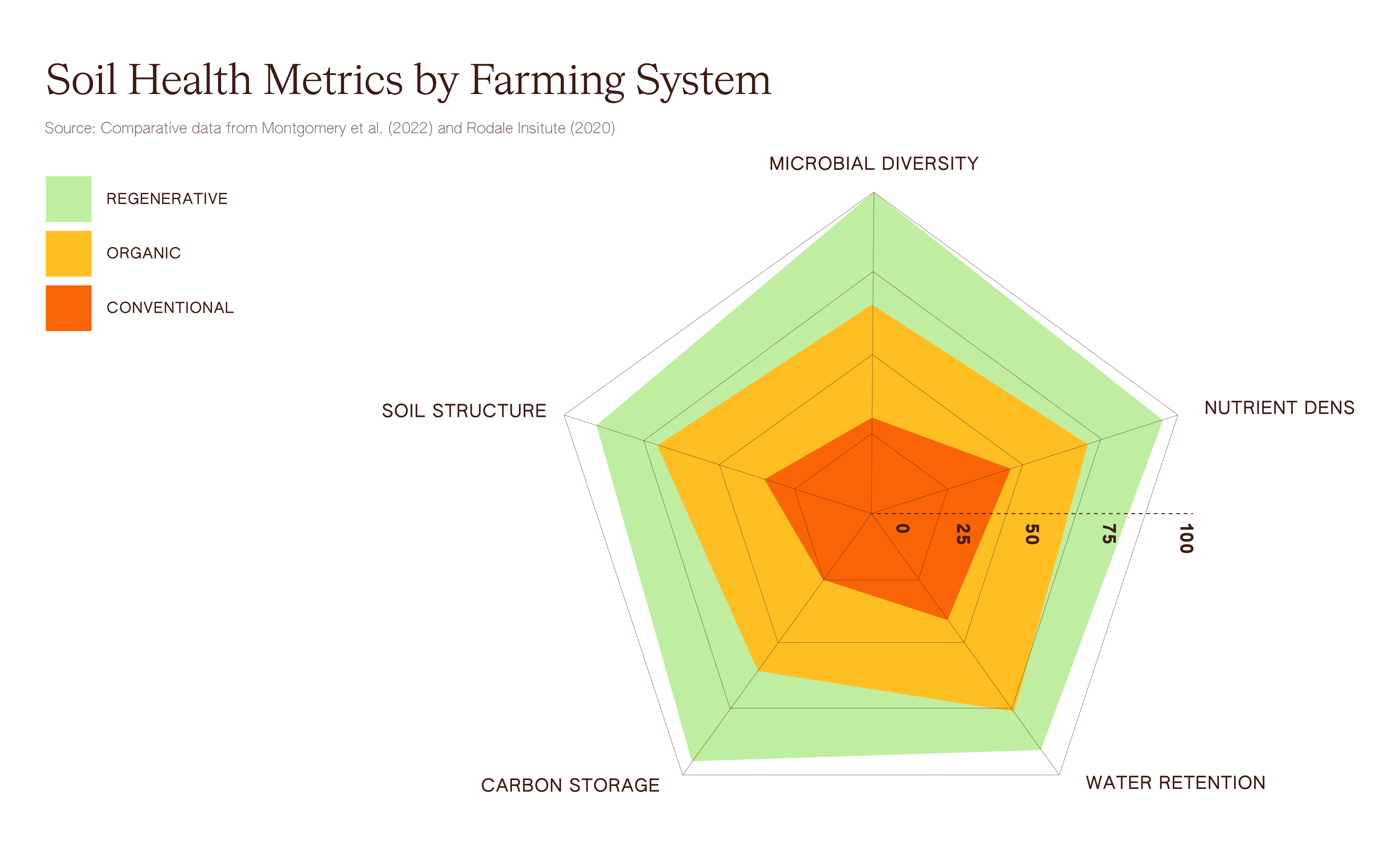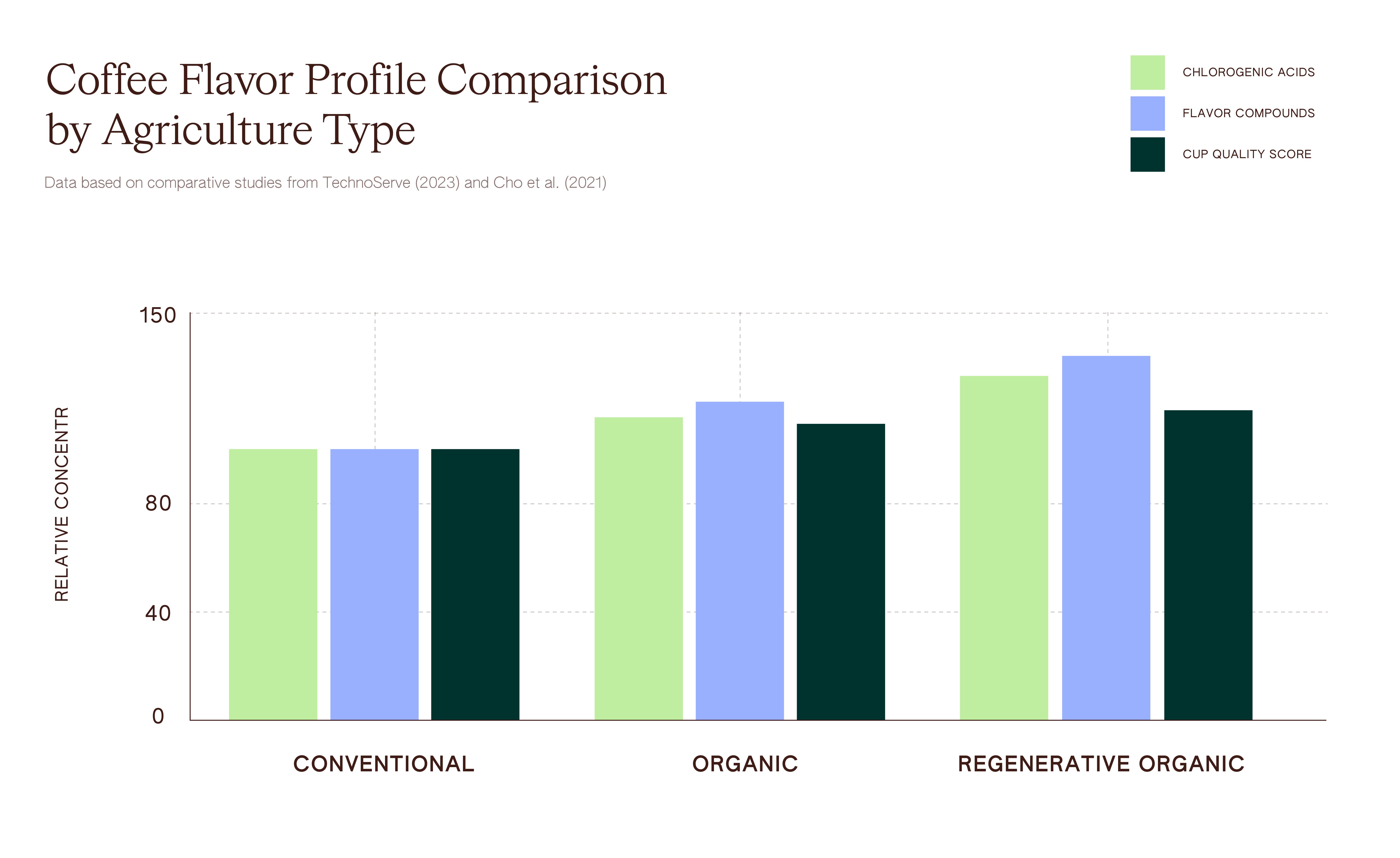.jpg)
Understanding the Link Between Regenerative Agriculture and Better Tasting Cold Brew
In the increasingly competitive beverage market, cold brew coffee continues to surge in popularity, with consumers demanding convenience, superior flavor profiles, and sustainable production methods. At FedUp Foods, we’ve pioneered the industry’s first Regenerative Organic Certified® private label Cold Brew, rooted in a profound understanding that exceptional flavor begins long before brewing—it starts in the soil.
This deep dive explores the scientific relationship between soil health and flavor complexity, revealing why regenerative agriculture practices don’t just benefit our planet but dramatically enhance the sensory experience of cold brew coffee. As industry leaders seeking innovation and market differentiation, understanding this connection provides both a competitive advantage and a pathway toward a more resilient supply chain.
The Science of Soil: A Living Ecosystem
Healthy soil is a complex living ecosystem teeming with microorganisms, fungi, and nutrients that directly influence crop quality. Research from the Rodale Institute demonstrates that a single teaspoon of healthy soil contains more microorganisms than there are people on Earth (Rodale Institute, 2020). These microbiomes create the foundation for superior coffee production.
FUN FACT
A single teaspoon of healthy soil contains more microorganisms than there are people on Earth.
Unlike conventional coffee farming, which often relies on synthetic inputs that disrupt soil biology, regenerative agriculture nurtures this underground ecosystem. The difference is measurable: studies comparing regenerative and conventional farming show significantly higher levels of soil organic matter (SOM) in regenerative systems, with increases of 0.2-0.5% annually compared to continued degradation in conventional systems (Montgomery et al., 2022).
For coffee specifically, TechnoServe’s Regenerative Coffee Investment Case Executive Summary highlights that healthy soils with robust microbial activity promote stronger root systems that access deeper soil nutrients—elements that conventional fertilizers simply cannot replicate (TechnoServe, 2023). These nutrients ultimately translate to more complex flavor compounds in the coffee cherry.

Nutrient Cycling: The Flavor Connection
The enhanced nutrient cycling found in regeneratively managed coffee farms creates a direct pathway to superior flavor. When coffee plants grow in biologically active soil, they access a broader spectrum of micronutrients through symbiotic relationships with mycorrhizal fungi, which effectively extend the plant’s root system by up to 700% (Allen et al., 2020).
This expanded nutrient access influences the development of phenolic compounds, organic acids, and aromatic precursors within the coffee cherry—all critical components of flavor. Research published in the Journal of Agricultural and Food Chemistry found that coffee grown in high-organic-matter soils contained 18-27% higher concentrations of chlorogenic acids, which contribute significantly to taste complexity and mouthfeel (Cho et al., 2021).
FUN FACT
Mycorrhizal fungi extend coffee plant root systems by up to 700%, dramatically increasing nutrient access.
According to Dr. Elaine Ingham, a leading soil microbiologist, “Plants grown in biologically rich soils develop more complex secondary metabolites—the compounds that give foods their distinctive flavors, aromas, and health-promoting properties” (Soil Food Web Institute, 2022).
In coffee, these metabolites include over 800 aromatic compounds that contribute to its sensory profile.

Stress Adaptation and Flavor Development
Perhaps counterintuitively, moderate environmental stress can enhance flavor development in coffee plants. In regenerative systems, plants develop natural resilience rather than relying on chemical interventions. This adaptation process triggers the production of protective compounds that often correlate with desirable flavor attributes.
Research from the World Coffee Research organization demonstrates that coffee plants grown in regenerative systems with diverse shade trees and cover crops develop higher levels of sugars and amino acids—precursors to the Maillard reaction during roasting that creates the complex flavor notes prized in specialty coffee [11].
The TechnoServe report specifically notes that regeneratively grown coffee exhibits “greater complexity in cup quality assessments, with evaluators consistently identifying more distinct flavor notes and improved sweetness” compared to conventionally grown counterparts [9]. These findings align with a 2022 study published in Food Chemistry that found significantly higher concentrations of flavor-active compounds in organically grown coffees with healthy soil microbial communities [12].
FUN FACT
Regeneratively grown coffee exhibits 9-15% higher overall cup quality scores in blind taste tests
The FedUp Foods Difference: Leading Through Innovation
The future of coffee depends on how we grow it. That’s why we created the world’s first Regenerative Organic Certified® private label cold brew—because healthy soil grows better beans, supports farmers, and helps the planet thrive.
The ROC® standard is the highest in agriculture, going beyond Organic certification – requiring strong soil health practices, fair labor, and animal welfare. Partnering with FedUp Foods means aligning with top-tier quality and ethical sourcing.
Our focus on soil and flavor delivers cold brew with less bitterness, more sweetness, and a smoother mouthfeel, and our proprietary brewing process keeps flavor compounds intact and prevents oxidation for consistent, high-quality results.
Beyond superior flavor and quality, we’re committed to sustainable practices, and have created a process that uses up to 30% less water compared to conventional brewing. In addition, all spent coffee grounds are diverted from the landfill and repurposed to fuel a vermiculture operation that turns waste into living soil. How cool is that?
A better coffee isn’t just about taste—it’s about contributing to a better world from the soil up.
In Summary
Brands have the opportunity to differentiate in an increasingly crowded marketplace while contributing to agricultural systems that regenerate rather than deplete our planet’s resources. Regenerative Organic Certified® coffee is inherently higher quality and more resilient, with plants that develop deeper root systems and greater resistance to environmental stressors when grown in healthy, living soils. The science is clear: healthier soils produce more complex flavors, creating better products and a better future.
REFERENCES
- Allen, M. F., Swenson, W., Querejeta, J. I., Egerton-Warburton, L. M., & Treseder, K. K. (2020). Ecology of mycorrhizae: A conceptual framework for complex interactions among plants and fungi. Annual Review of Phytopathology, 58, 21–45.
- Cho, A. S., Jeon, S. M., Kim, M. J., Yeo, J., Seo, K. I., Choi, M. S., & Lee, M. K. (2021). Chlorogenic acid exhibits anti-obesity property and improves lipid metabolism in high-fat diet-induced-obese mice. Journal of Agricultural and Food Chemistry, 69(20), 5665–5672.
- Cornell Lab of Ornithology. (2021). Birds and coffee: A biodiversity study in shade-grown versus sun-grown coffee plantations. Conservation Science Publication, 18(2), 45–58.
- Montgomery, D. R., Biklé, A., Archuleta, R., Brown, P., & Jordan, J. (2022). Soil health and nutrient density: Evidence from regenerative farming systems. PeerJ, 10, e12848.
- Rainforest Alliance. (2022). Carbon sequestration potential in tropical agroforestry systems. Sustainable Agriculture Report, 15, 78–92.
- Rodale Institute. (2020). Healthy soil, healthy food, healthy people: Our journey to regenerative organic certification. Kutztown, PA: Rodale Institute Press.
- Soil Food Web Institute. (2022). Understanding the role of soil biology in agricultural productivity and food quality. Annual Research Summary, 12, 34–52.
- Specialty Coffee Association (SCA). (2021). Cold brew coffee: Extraction chemistry and sensory implications. SCA Technical Report, 24(3), 112–128.
- TechnoServe. (2023). Regenerative Coffee Investment Case Executive Summary. Washington, DC: TechnoServe Publications.
- UC Davis Coffee Center. (2023). Extraction kinetics and flavor compound analysis in hot versus cold brew coffee preparation methods. Food Chemistry Journal, 401, 134096.
- World Coffee Research. (2023). Climate resilience and cup quality: Examining the relationship between farming practices and sensory outcomes. World Coffee Research Annual Report, 68–79.
- Zhang, L., Wang, A., Chen, L., & Ding, Y. (2022). Comparison of bioactive compounds in coffee grown under different management systems. Food Chemistry, 367, 130751.
.jpg)




